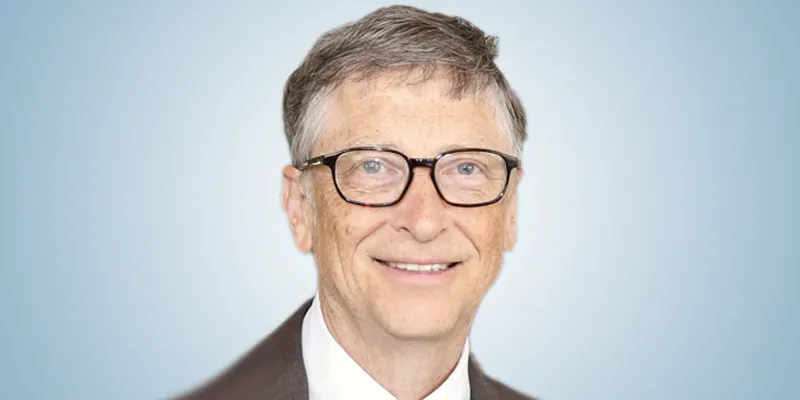5 books that Bill Gates recommends you read over the holidays
In the middle of handling an empire worth billions and running one of the largest social foundations in the world, there is one thing that Bill Gates will never compromise on – his reading.
Everyone knows that the Microsoft Founder is a voracious reader. But did you know that he reads about a book a week on an average, in any given year? That’s about 52 books a year! And let’s not forget the man’s impossibly hectic schedule.

Image credits: www.wikipedia.com
This unwavering commitment to reading has been Gates’ passion since he was a little child. In his recent blog post, he speaks about how when he was growing up, there was no internet, and hence no access of the kind we are privileged enough to enjoy today.
“When I was young, there were few options to learn on my own. My parents had a set of World Book Encyclopedias, which I read through in alphabetical order. But there were no online courses, video lectures, or podcasts to introduce me to new ideas and thinkers as we have today,” he writes.
As a ritual, Gates has begun to share annually, a list of the books that made an everlasting impression on him. This year too, he has shared a list of his favourite five books which he binge-read over the year, heartily recommending that you to read over the holidays. Covering a wide range of topics, these books are sure to give you an insight into life, learning, and a fraction of what Bill Gates enjoys.
String Theory by David Foster Wallace
Goodreads rating: 4.24/5
The New York Times deemed Wallace the “best tennis-writer of all time”, and with good reason. Writing about the book, Bill Gates says, “You don’t have to play or even watch tennis to love this book. The late author wielded a pen as skilfully as Roger Federer wields a tennis racket.” The book is a collection of five of Wallace’s best essays on tennis, with an insight into the present and future of the sport, coupled with profiles on legends like Tracy Austin and, as mentioned above, Roger Federer. The author gracefully crosses over from the narrative of a sports journalist to someone who is a part of the game himself. The flow beckons the reader inside the mind of both the author and the player he describes, which is probably why Gates, who took to playing the sport recently, could relate to it so much.
The Gene by Siddhartha Mukherjee
Goodreads rating: 4.35/5
Siddhartha Mukherjee, the Pulitzer Prize-winning author of The Emperor of Maladies, has combined science, social history, and personal narrative to explore one of the most complex equations of life – human heredity and its impact and influence on our personalities, identities, and choices. To Gates, who works with technology that will determine the future, this book specially appealed to him, considering it deals with the “past, present and future of genome science with a special focus on huge ethical questions that the latest and greatest genome technologies provoke.”
Shoe Dog by Phil Knight
Goodreads rating: 4.37/5
Knight’s story of Nike’s rise from an amateur startup to an iconic brand is personally appeals to Gates, for whom it is a “refreshingly honest reminder of what the path to business success really looks like: messy, precarious, and riddled with mistakes.” The Founder and CEO of Nike started his journey with a borrowed $50 in his pocket and a vision to build one of the greatest sports brands in the world. As Gates articulately puts it, it isn’t the fact that Knight is trying to teach his readers anything new. Rather, it is his starkly honest narrative that makes the story so relatable for anybody who has set out to achieve big with nothing but an iron will and a dream.
The Myth of the Strong Leader by Archie Brown
Goodreads rating: 3.55
In lieu of the recent US Presidential Elections, Gates believes that this is a book that is a must-read for anyone who was surprised with the results. Through a well-placed survey of over a 100 years of political leadership, Brown goes on to challenge the general norm that the ‘strongest leaders’ have to be successful, popular, and admirable. He speaks about how this holds true especially for democracies, where the advantages of a collegial style of leadership is often overlooked. Franklin D Roosevelt, Lyndon B Johnson, Willy Brandt, Mikhail Gorbachev, Tony Blair, and Margaret Thatcher are some of the names that Brown uses as case studied to prove the same. For Gates, this book features on his must-read list because he believes that people need to “recognize that no one person can or should have all the answers.”
The Grid by Gretchen Bakke
Goodreads rating: 3.78
To Gates, “the electrical grid is one of the greatest engineering wonders of the modern world.” Although once considered an ‘engineering triumph’, America’s electrical grid has now grown old and desolate, desperately in need of repair. Bakke speaks about how it is this grid which stands in the way of humans adopting sustainable energy measures like investing in solar power, wind energy, and other environmental-friendly alternatives. Before building the Microsoft empire, Gates’ first job had been to write software for the entity that controlled the power grid in the north-west of the US. The reason he recommends everyone to read this deeply insightful book, which explains the power-structures of the grid and the need for a change, is because the masses need to realise how difficult it is to ‘modernise’ the grid, thus halting the fast growth of a future petering towards clean-energy.
Inspired much?







